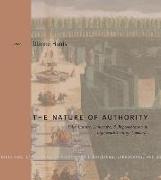- Start
- The Nature of Authority
The Nature of Authority
Angebote / Angebote:
Italian villas are generally regarded as beautiful havens where a privileged elite, fleeing the harsh realities of the city, found peace and harmony amid buildings and gardens framed upon classical ideals of proportion, balance, and the natural. In her interdisciplinary book, Dianne Harris presents a radically different view of villa life as it developed during the eighteenth century on the vast estates dominating the fertile Lombard plain. Governed from Vienna by a Habsburg regime bent upon increased tax revenues, the great landowning families lived lives fraught with tensions and contradictions. Although they retained many privileges and indulged in shows of wealth and social distinction, they faced mounting demands for reform and progress from an absolutist state.The Nature of Authority employs what Harris calls "panoramic history" to trace the mingling of enlightened reform and a culture of display in the design and functioning of villas and villa life in eighteenth-century Lombardy. Cadastral maps are juxtaposed with Marc'Antonio Dal Re's famous prints of the "delights" of villa life, both are woven into an exceptionally wide-ranging investigation of the villas, their gardens, and crop-bearing fields and their representation in visual and written sources from agricultural treatises to books of etiquette. Combining this diverse material with a sharp focus upon the organization of space and class privilege, Harris shows how the villas served as centers of complex cultural and sociopolitical transactions, fashioning a landscape that was at once a beguiling vista and a tool in the enforcement of a strict hierarchy of use and value.Harris's innovative book reveals the complicityof landscape in the formation of culture and the structures of everyday life. It also elucidates the significance of Lombardy as a testing ground for Habsburg policies of enlightened reform in the social and natural orders.
Folgt in ca. 15 Arbeitstagen
